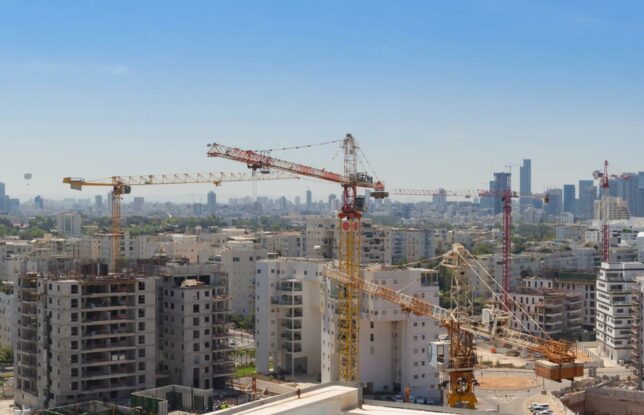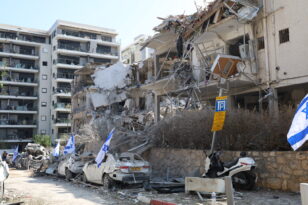According to the Chief Economist at the Ministry of Finance, 336,000 construction workers were employed in the first quarter of 2025—highlighting a construction worker shortage of 38,000. At the same time, the number of Palestinian workers—who have been allowed to work only in the West Bank since October 7—has surged to over 20,000. The Israel Builders Association stated: “We call on the government to let us carry out an airlift operation to bring in foreign workers.”
By Doron Breitman, Nadlan Center
As of the first quarter of 2025, Israel’s construction industry is facing a shortage of roughly 38,000 workers, according to a report released Wednesday by the Chief Economist’s Division at the Ministry of Finance. This construction worker shortage persists despite a significant rise in employment over the past year and a half, following the outbreak of the Swords of Iron war. The total number of construction workers in Q1 2025 stands at 336,000. Notably, the number of Palestinian workers—whose employment has been limited to the West Bank since October 7—has surged to over 21,000, more than five times the figure from Q1 2024, when just 4,000 were employed.
The construction workforce currently includes 62,000 foreign workers, 138,000 non-Arab Israelis, and 116,000 Arab Israeli citizens.
According to the report, the construction industry in Israel has seen substantial growth in employment over the past decade, but has also experienced volatility in recent years due to national crises—most notably the COVID-19 pandemic and the Swords of Iron war. After gradually recovering from the COVID downturn, the construction sector reached a record 353,000 employed workers in Q3 2023. However, the outbreak of the war and subsequent government restrictions on Palestinian laborers led to a steep decline, down to 239,000 workers by Q4 2023.
The report’s authors, Najib Amariya and Assaf Geva, note that the gradual rise in both foreign workers and local Israeli workers—especially Arab Israelis—largely offset the decline in Palestinian labor. As a result, the construction workforce rebounded to 336,000 by Q1 2025. Arab Israelis made up 26% of the sector in Q4 2023, a share that grew to 34% by Q1 2025. In contrast, non-Arab Israeli workers increased from 35% to 41% over the same period.
The data also show a steady rise in the number of Palestinian workers, despite the ongoing policy barring their entry into Israel. Their numbers dropped to just 6,000 in Q4 2023 and declined further to 4,000 in Q1 2024, before surging to 21,000 in Q1 2025. Still, their share of the overall construction workforce remains low—just 6% in Q1 2025, compared to 31% before the war.
Roni Brik, President of the Israel Builders Association, responded to the Finance Ministry’s data: “For the first time ever, over the past year, the average construction time for an apartment has jumped from 34.5 months to 39 months. This is a direct result of the massive construction worker shortage caused by the decision to halt Palestinian labor since October 7. Whether or not that decision was justified, the foreign workers intended to replace Palestinians are in extremely short supply. Even before Operation Rising Lion, Finance Ministry reports made it clear that the sector was already short about 40,000 workers. In the wake of the operation, Israel now needs at least 20,000 more workers to meet the growing demand for repairs, demolitions, and the reconstruction of entire neighborhoods damaged by missile strikes.”
“Once again, we call on the government to allow the construction industry, under our leadership, to carry out an airlift operation to bring in foreign workers—without government involvement. We will coordinate with state-appointed manpower agencies to bring in 60,000 foreign workers in a very short time. Just recently, we saw the government manage to bring 80,000 Israelis home in five days. We believe a foreign worker airlift could resolve the construction worker shortage within just a few weeks.”

Nadlan Center is Israel’s leading real estate news and knowledge platform in Hebrew, created for industry professionals. Founded by experts in the field, it delivers in-depth, up-to-date coverage on urban renewal, planning and construction, taxation, and housing policy — tailored to the needs of developers, investors, planners, and financiers. In addition to its widely read news content, Nadlan Center hosts major industry events, professional conferences, and training programs that support the growth and development of the Israeli real estate sector.
Learn more: https://www.nadlancenter.co.il





